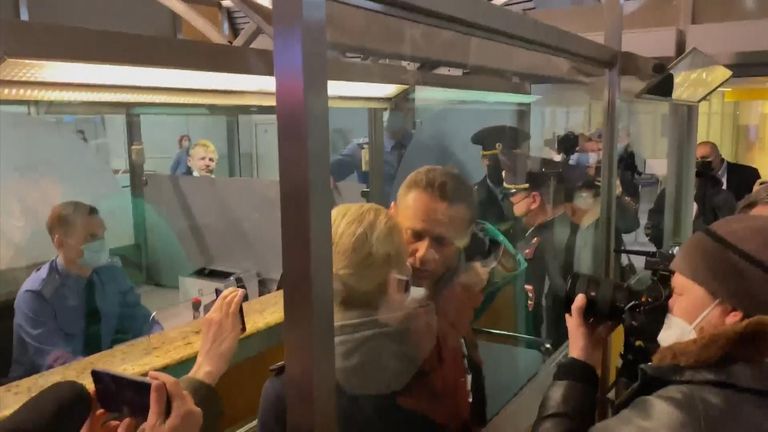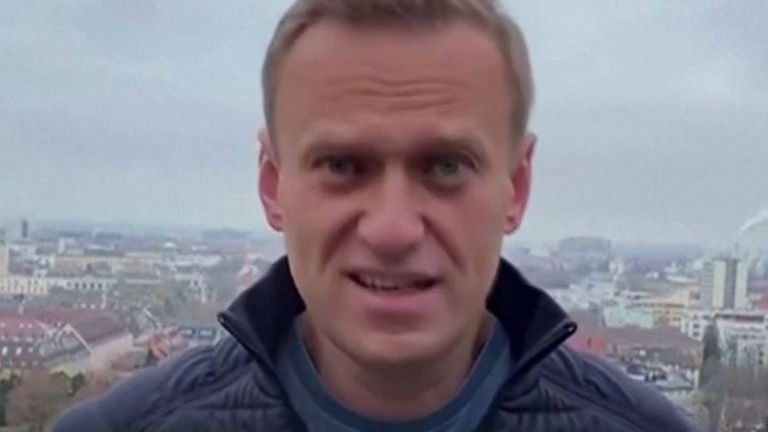Dominic Raab has called for the immediate release of Putin critic Alexei Navalny.
The foreign secretary has joined a host of leading politicians who have condemned Mr Navalny’s arrest on his return to Russia, after he was poisoned with a nerve agent last year.
Mr Raab said: “It is appalling that Alexei Navalny, the victim of a despicable crime, has been detained by Russian authorities. He must be immediately released.
“Rather than persecuting Mr Navalny, Russia should explain how a chemical weapon came to be used on Russian soil.”
Mr Navalny was detained at Moscow’s Sheremetyevo airport on Sunday, after spending five months in Germany recovering from poisoning with a Novichok nerve agent.
The 44-year-old, who is one of Vladimir Putin’s most outspoken critics, blames Moscow for the attack that nearly killed him, although the Kremlin denies any involvement.
His detention minutes after landing was widely expected because Russia’s prisons service said he had violated parole terms from a suspended sentence on a 2014 embezzlement conviction.
He is due to be held until a date is set for his case. Lawyers for Mr Navalny said they have not been granted access to him.
The arrest has prompted international calls for his release, with the US, the UK, Germany, and France condemning Moscow.
On Monday, vaccine deployment minister Nadhim Zahawi told Sky News the UK government was “very worried” about Mr Navalny’s safety.
He said: “The foreign secretary will say more about this, but we are very worried about the wellbeing and safety of Alexei Navalny.
“And of course, we have to make sure that the Russian government answers why a poison was used.”
Mike Pompeo, US secretary of state, said Washington “strongly condemns” the decision to arrest Mr Navalny and called his detention “the latest in a series of attempts to silence Navalny and other opposition figures and independent voices who are critical of Russian authorities.”
He added on Twitter that he was “deeply troubled” by the move.
“Confident political leaders do not fear competing voices, nor see the need to commit violence against or wrongfully detain, political opponents,” he said.
President-elect Joe Biden’s pick for national security adviser called on the Russian authorities to free him.
“Mr Navalny should be immediately released, and the perpetrators of the outrageous attack on his life must be held accountable,” Jake Sullivan said in a tweet.
Charles Michel, president of the European Council, called Mr Navalny’s arrest “unacceptable” and demanded his immediate release.
He was echoed by the French foreign ministry and German foreign minister Heiko Maas.
Mr Maas said: “Russia is bound by its own constitution and by international obligations to the principle of the rule of law and to the protection of civil rights.
“These principles must, of course, be applied to Alexei Navalny as well. He should be released immediately.”
On leaving Berlin on Sunday, Mr Navalny said he didn’t think he would be arrested as he had “every right” to return to his home country.
The arrest raises tensions in Russia as it approaches national parliament elections this year, in which Mr Navalny’s organisation is expected to be active in trying to defeat pro-Kremlin candidates.
“This is a real act of bravery for Alexei Navalny to return to Russia, given that government agents already tried to kill him once,” Human Rights Watch executive director Kenneth Roth tweeted.
“But he understandably wants to be part of the pro-democracy movement in Russia, not a dissident in exile.”
Mr Navalny fell into a coma while aboard a domestic flight from Siberia to Moscow on 20 August.
He was transferred to a hospital in Berlin two days later.
Labs in Germany, France and Sweden tested the substance he was exposed to.
It was established he was poisoned with a Soviet-era novichok nerve agent – the same kind of substance used against Sergei and Yulia Skripal, a former Russian double agent and his daughter, in a 2018 poisoning in Salisbury.



